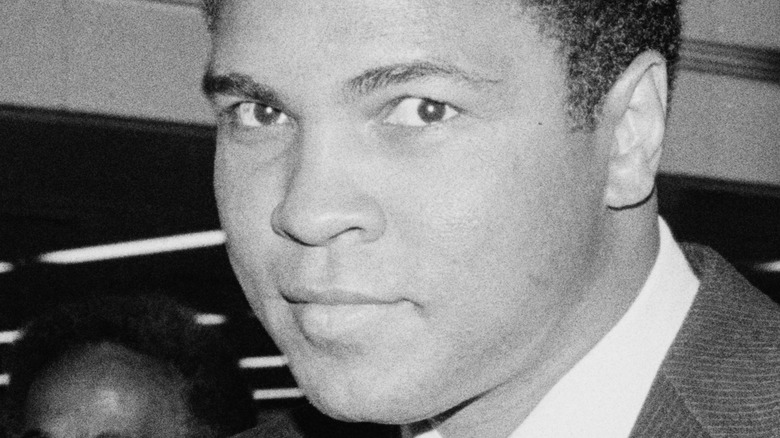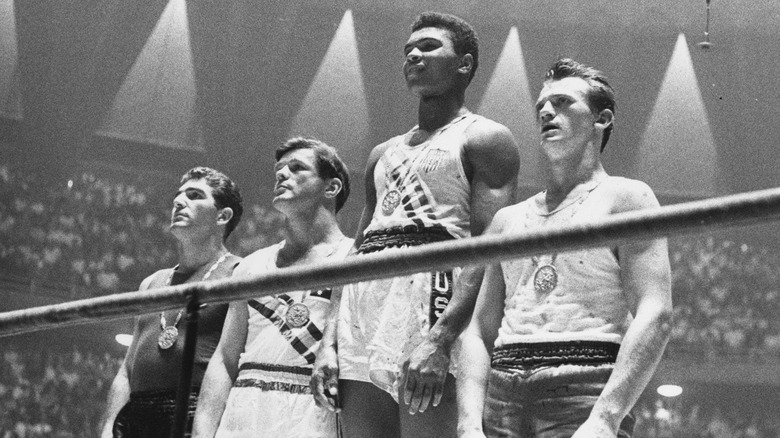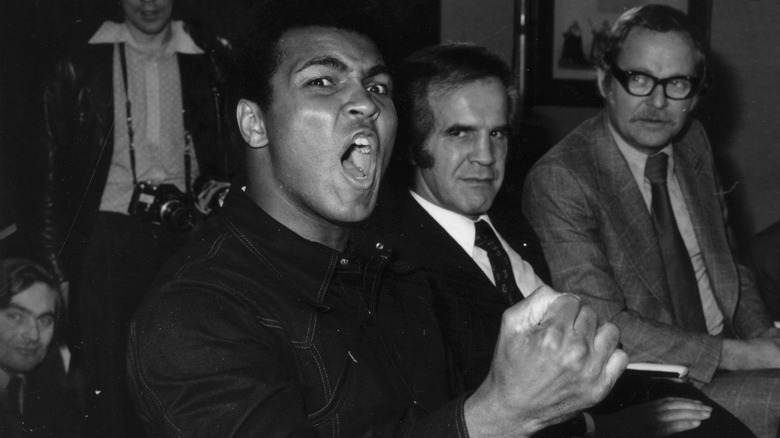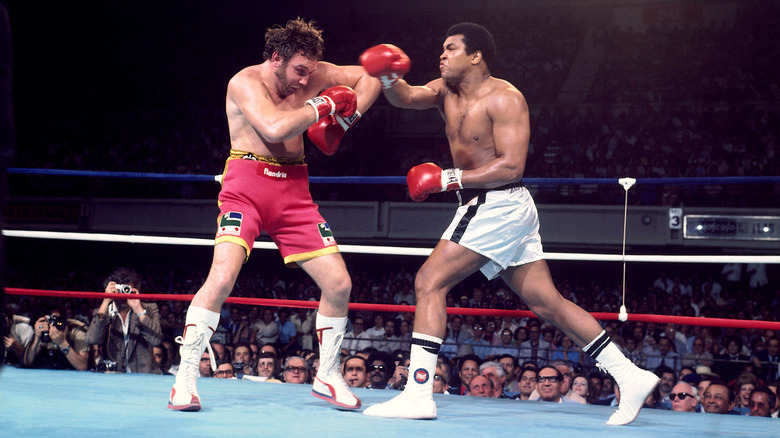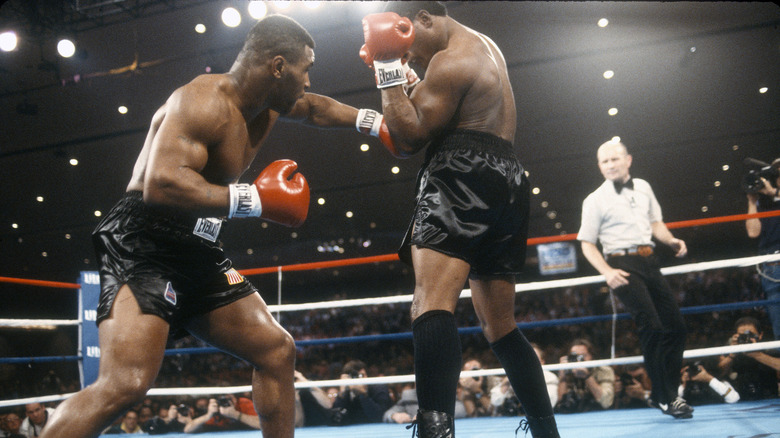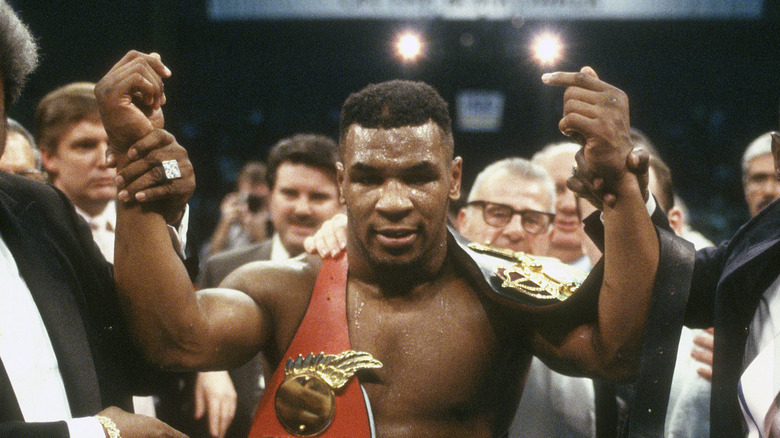The Only Fighter Muhammad Ali Ever Feared, According To George Foreman
Muhammad Ali is regarded as one of the greatest athletes to ever walk the planet. So great in fact, that one of his nicknames is "The Greatest," per ESPN. He was known for his quick hands and fast feet in the ring, but was also highly regarded for his activism, which is credited with being the blueprint for the way athletes can use their platforms to deliver political messages and create positive changes away from their sport (via NPR).
As one of the most ferocious competitors in sports history, it's hard to imagine Ali turning down an opportunity to fight anyone. However, former heavyweight champion George Foreman is quoted in the book "Muhammad Ali: The Life of a Legend" by Fiaz Rafiq as saying (via The U.S. Sun) that Ali himself said he was concerned about the prospect of facing one, a hard-hitting young boxer in particular. That fighter was none other than Mike Tyson.
Cassius Clay becomes Muhammad Ali
Cassius Marcellus Clay Jr. was born in Louisville, Kentucky on January 17, 1942. According to Biography, he had an unusual introduction to boxing. After his bike was stolen, Clay approached a police officer named Joe Martin and said that he wanted to beat up the bicycle thief. Martin told him that it would be in his best interest to learn how to fight before going around challenging people. Fortunately, it just so happened that Martin was a boxing trainer on the side, so Clay started working with him and quickly learned the finer points of boxing.
By 1960, Clay was on the United States Olympic boxing team and took home the light heavyweight gold medal at the Summer Olympics in Rome by defeating Polish pugilist Zbigniew Pietrzkowski. Clay was hailed as a hero upon his return to the United States and he was on the fast track to a historic boxing career. That was just the start of his time in the spotlight, but it was toward the end of his Cassius Clay era.
In 1964, Clay joined the Nation of Islam and started calling himself Cassius X, but eventually decided on a different name — Muhammad Ali — and converted to Islam in the 1970s.
Muhammad Ali the activist
Ali was a vocal critic of the Vietnam War and when he was drafted into the military in 1967, he refused to serve in the military, citing his religious views, per Biography. Ali's refusal to enter the army led to him being sentenced to five years in prison, a $10,000 fine, and a three-year ban from professional boxing. According to History, Ali managed to stay out of prison after appealing his sentence, but he was still kept out of the ring until October 26, 1970, when he took on boxer Jerry Quarry in Atlanta, Georgia. Ali won the fight in the third round via knockout, per History.
In 1971, with his career back on track, Ali took on Joe Frazier in what was dubbed the "Fight of the Century," but lost. It was the first time he had lost in his professional career. However, a few months later, Ali had a win outside of the ring, when the Supreme Court overturned his conviction for trying to evade the draft.
Ali retires
Ali won his 1974 rematch with Frazier, winning by decision after 12 hard-fought rounds. He took on heavyweight champion George Foreman on October 30, 1974, in Kinshasa, Zaire, in a fight famously dubbed the "Rumble in the Jungle," in which Ali won and reclaimed the heavyweight title by knocking Foreman out in the eighth round (via History).
Ali had several more high-profile fights through the rest of the 1970s, including a third tilt with Frazier that was dubbed the "Thrilla in Manila" and took place — obviously — in the Philippines, and a back and forth with heavyweight Leon Spinks for the title. Ali announced his retirement in 1979 but returned to the ring in the early 1980s to take on Larry Holmes. Ali lost that fight via knockout, and then took on Trevor Berbick in 1981, losing that fight as well. It was his last fight and Ali left the ring for good with a 56-5 record. However, while Ali was hanging up his gloves, another fighter was just getting started.
Tyson in his prime
Mike Tyson was born in 1966 and hailed from Brooklyn. He quickly garnered a reputation for being one of the most fierce — and feared — fighters to ever step into the ring. Tyson had a troubled upbringing that included committing crimes as part of a gang, but eventually found his way to boxing.
According to Biography, Tyson made his professional debut in 1985, when he knocked out Hector Mercedes in a single round. From that point, Iron Mike, as he came to be known, was turning heads, including Ali's. In the book "Muhammad Ali: The Life of a Legend" by Fiaz Rafiq, George Foreman recounted a conversation he had with Ali about Tyson.
"I said to him, 'Do you think Tyson could beat anybody?' He said, 'Man, Tyson hits so hard.' He felt Tyson hit harder than anyone he'd faced," Foreman said in the book. "He told me once that he didn't have the confidence he could have beaten Mike Tyson" (via The U.S. Sun).
Tyson avenges Ali's loss to Larry Holmes
Ali was several years removed from his professional career by the time Iron Mike made his debut, so the likelihood of the two ever crossing paths in the ring was low, if there was any chance of it at all. Tyson idolized Ali and famously vowed to avenge his hero's 1980 loss to Larry Holmes.
Tyson was just 14 years old and had watched the fight on TV with his mentor and trainer Cus D'Amato as Ali was demolished by Holmes at Caesar's Palace in Las Vegas. D'Amato called Ali the next day, and let Tyson talk to his hero. "When I grow up, I'll fight Holmes and I'll get him back for you," he said (via TalkSport).
Tyson was true to his word, and in 1988, promoter Don King — who had also worked with Ali — coaxed the 38-year-old, retired Holmes back into the ring to fight Tyson. Ali was in attendance and sat ringside. Before the fight, he could be seen whispering something in Tyson's ear. He reportedly told Tyson, "Remember what you said — get him for me." Tyson did just that and defeated Holmes in just four rounds.
